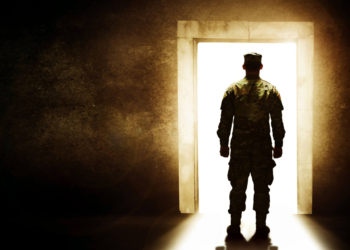Lifelong advocate Million Heir-Williams isn’t used to hearing the word no. So when she heard that her son wasn’t going to get the benefits and care he needed from the VA because of his mental health conditions, she decided to do something about it. That path led her to write a book, “Military Mom on a Mission: An Advocate for Mental Health.” The book explores how to embrace the person who comes home from the war with mental illness.
When Heir-Williams welcomed her son home from his deployment to Iraq, she was grateful that he returned in one piece. Jerome, a former Marine, participated in the first surge into Iraq in 2003. In the earliest days of the Global War on Terror, body armor wasn’t up to today’s standards, and IEDs and roadside bombs were very common.
“He came back with all his body parts but lurking within the walls of his mind was PTSD, severe psychosis, bipolar disorder, and schizophrenia,” Heir-Williams said.
After being discharged from the Marine Corps, Jerome, who Heir-Williams calls Champion, had a mental breakdown. Due to the stigma surrounding mental health care at the time, Heir-Williams said it was incredibly difficult for Champion to get any help at first.
“We spoke with his commander, his first sergeant, everyone we could get to and it wasn’t doing any good,” Heir-Williams said.
She knew her son was in trouble and was struggling with processing what he’d seen during his deployment but couldn’t find the help and the resources to connect his needs with the right providers. Finally, Heir-Williams got her congressman involved.
“I don’t accept no when I’m on a mission. If I need to accomplish something, the word no is absolutely nothing to me. If it’s the right thing to do, I will go all the way to the top and beyond to make it happen,” she said.
Heir-Williams says she was grateful the breakdown happened just six weeks after Champion left the Marine Corps because any longer would have made it even more difficult for him to get the care he needed.
She wrote to the VA, continued to involve her congressional representatives, and kept knocking on doors. Those efforts resulted in Champion getting all his back pay and his benefits. He’s now 100 percent-service disabled, which entitles him to care at the VA and a pension for the rest of his life. But, Heir-Williams says that the reason Champion got any of that at all was that she demanded it.
“Had I been the kind of mom who just sat back and hoped something would happen, he would not be alive today,” she said.
Now, Champion is doing very well in therapy and takes his medications as prescribed. He lives on his own and can manage his conditions independently.
Throughout the entire process, Heir-Williams kept excellent records, logging conversations, making notes, and keeping a paper trail of her efforts. She said one Saturday, she decided to sit down and put it all in order, and that’s when it occurred to her that she needed to write a book.
“Military Mom on a Mission: An Advocate for Mental Health” seeks to inform and encourage military families who are living with mental illness. It provides a step-by-step guide of Heir-Williams’ efforts, along with templates for correspondence she sent out on Champion’s behalf.
“It is very important to me to share with others who are dealing with mental illness, specifically as it relates to the military community. I share my experience as a mother who assisted her son who was without a voice,” she said.
Along the journey, Heir-Williams realized that military families, like service members, must be both resilient and resourceful.
She hopes that the book will help other families find hope when the world seems dark.
“I want to be the bridge of knowledge, information and awareness between the civilian population and the military sector. The divide is too huge and the gap needs to close,” she said.
“Military Mom on a Mission: An Advocate for Mental Health” is available for purchase online.














































